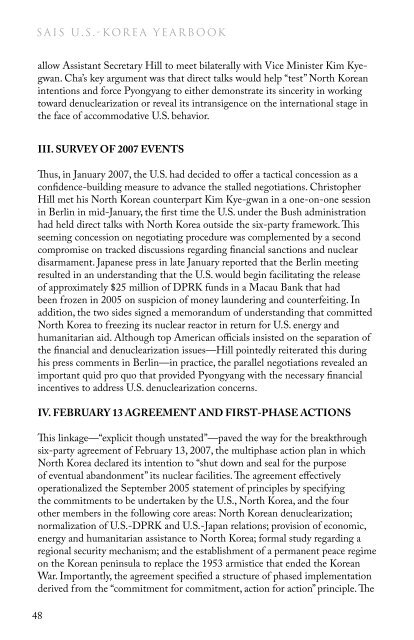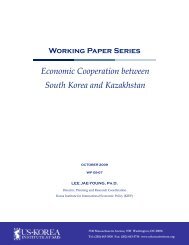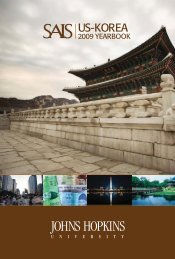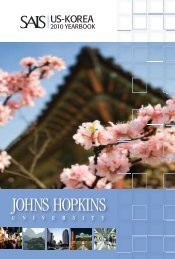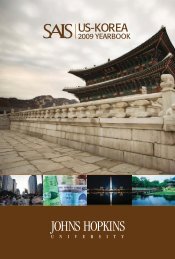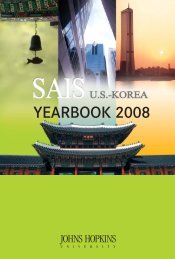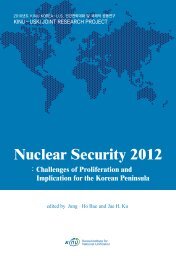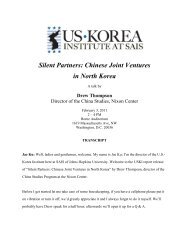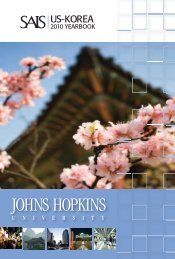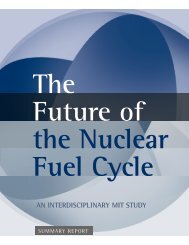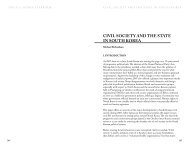YeArBooK 2007 - US-Korea Institute at SAIS
YeArBooK 2007 - US-Korea Institute at SAIS
YeArBooK 2007 - US-Korea Institute at SAIS
You also want an ePaper? Increase the reach of your titles
YUMPU automatically turns print PDFs into web optimized ePapers that Google loves.
saIs U.s.-<strong>Korea</strong> YearbooK<br />
allow Assistant Secretary Hill to meet bil<strong>at</strong>erally with Vice Minister Kim Kyegwan.<br />
Cha’s key argument was th<strong>at</strong> direct talks would help “test” North <strong>Korea</strong>n<br />
intentions and force Pyongyang to either demonstr<strong>at</strong>e its sincerity in working<br />
toward denucleariz<strong>at</strong>ion or reveal its intransigence on the intern<strong>at</strong>ional stage in<br />
the face of accommod<strong>at</strong>ive U.S. behavior.<br />
48<br />
III. SUrVeY of <strong>2007</strong> eVenTS<br />
Thus, in January <strong>2007</strong>, the U.S. had decided to offer a tactical concession as a<br />
confidence-building measure to advance the stalled negoti<strong>at</strong>ions. Christopher<br />
Hill met his North <strong>Korea</strong>n counterpart Kim Kye-gwan in a one-on-one session<br />
in Berlin in mid-January, the first time the U.S. under the Bush administr<strong>at</strong>ion<br />
had held direct talks with North <strong>Korea</strong> outside the six-party framework. This<br />
seeming concession on negoti<strong>at</strong>ing procedure was complemented by a second<br />
compromise on tracked discussions regarding financial sanctions and nuclear<br />
disarmament. Japanese press in l<strong>at</strong>e January reported th<strong>at</strong> the Berlin meeting<br />
resulted in an understanding th<strong>at</strong> the U.S. would begin facilit<strong>at</strong>ing the release<br />
of approxim<strong>at</strong>ely $25 million of DPRK funds in a Macau Bank th<strong>at</strong> had<br />
been frozen in 2005 on suspicion of money laundering and counterfeiting. In<br />
addition, the two sides signed a memorandum of understanding th<strong>at</strong> committed<br />
North <strong>Korea</strong> to freezing its nuclear reactor in return for U.S. energy and<br />
humanitarian aid. Although top American officials insisted on the separ<strong>at</strong>ion of<br />
the financial and denucleariz<strong>at</strong>ion issues—Hill pointedly reiter<strong>at</strong>ed this during<br />
his press comments in Berlin—in practice, the parallel negoti<strong>at</strong>ions revealed an<br />
important quid pro quo th<strong>at</strong> provided Pyongyang with the necessary financial<br />
incentives to address U.S. denucleariz<strong>at</strong>ion concerns.<br />
IV. feBrUArY 13 AGreeMenT And fIrST-PHASe ACTIonS<br />
This linkage—“explicit though unst<strong>at</strong>ed”—paved the way for the breakthrough<br />
six-party agreement of February 13, <strong>2007</strong>, the multiphase action plan in which<br />
North <strong>Korea</strong> declared its intention to “shut down and seal for the purpose<br />
of eventual abandonment” its nuclear facilities. The agreement effectively<br />
oper<strong>at</strong>ionalized the September 2005 st<strong>at</strong>ement of principles by specifying<br />
the commitments to be undertaken by the U.S., North <strong>Korea</strong>, and the four<br />
other members in the following core areas: North <strong>Korea</strong>n denucleariz<strong>at</strong>ion;<br />
normaliz<strong>at</strong>ion of U.S.-DPRK and U.S.-Japan rel<strong>at</strong>ions; provision of economic,<br />
energy and humanitarian assistance to North <strong>Korea</strong>; formal study regarding a<br />
regional security mechanism; and the establishment of a permanent peace regime<br />
on the <strong>Korea</strong>n peninsula to replace the 1953 armistice th<strong>at</strong> ended the <strong>Korea</strong>n<br />
War. Importantly, the agreement specified a structure of phased implement<strong>at</strong>ion<br />
derived from the “commitment for commitment, action for action” principle. The<br />
T H e “ T e e T H of d I P lo M a C Y ” : U . s . - d Pr K r e l aT Ion s<br />
and THe sIX-ParTY TalKs<br />
arrangement of quid pro quos in the “initial actions” phase introduced procedural<br />
regularity into the negoti<strong>at</strong>ion process, managing expect<strong>at</strong>ions and overcoming<br />
high barriers to mutual trust between the U.S. and North <strong>Korea</strong>.<br />
Banco Delta Asia<br />
But the new engagement str<strong>at</strong>egy embodied in the Berlin meeting and the<br />
February 13 agreement soon gave way to protracted implement<strong>at</strong>ion th<strong>at</strong> nearly<br />
imperiled the entire process. The U.S.’s pledge to facilit<strong>at</strong>e the transfer of frozen<br />
North <strong>Korea</strong>n funds from Macau-based Banco Delta Asia (BDA) proved a<br />
far more difficult task than originally expected by American diplom<strong>at</strong>s. The<br />
perception of U.S. reticence gave North <strong>Korea</strong> grounds to exercise its prerog<strong>at</strong>ive<br />
of refusing implement<strong>at</strong>ion of the denucleariz<strong>at</strong>ion accord until its frozen funds<br />
had been returned. The funds were first frozen in September 2005 after the<br />
U.S. Treasury Department initi<strong>at</strong>ed an investig<strong>at</strong>ion of BDA by describing it<br />
as a “financial institution of primary money laundering concern.” Th<strong>at</strong> action<br />
prompted a run on the bank, and Macanese banking authorities eventually<br />
froze the funds suspected of associ<strong>at</strong>ion with North <strong>Korea</strong>n illicit activity and<br />
assumed control of the family-run institution. The Treasury Department’s<br />
action, seemingly uncoordin<strong>at</strong>ed with more accommod<strong>at</strong>ive St<strong>at</strong>e Department<br />
initi<strong>at</strong>ives concerned <strong>at</strong> the time with the September 2005 negoti<strong>at</strong>ions,<br />
significantly affected North <strong>Korea</strong>’s perceptions of U.S. sincerity and the veracity<br />
of its commitment to a process of negoti<strong>at</strong>ion r<strong>at</strong>her than coercion. The U.S.<br />
investig<strong>at</strong>ion into BDA closed 18 months l<strong>at</strong>er, in March <strong>2007</strong>, <strong>at</strong> which time<br />
Washington decided to impose the “fifth special measure” under section 311 of<br />
the U.S. P<strong>at</strong>riot Act, prohibiting U.S. banks from holding accounts on behalf<br />
of BDA or BDA from opening or maintaining accounts in the U.S. While <strong>at</strong><br />
the time this was seen to clear the way for the return of funds to North <strong>Korea</strong>,<br />
it eventually became an impediment to the process, as priv<strong>at</strong>e U.S. and foreign<br />
banks were unwilling to risk involvement with the tainted monies.<br />
North <strong>Korea</strong>, fearing th<strong>at</strong> procedural difficulties reflected a broader lack of<br />
U.S. political will, resorted to familiar tactics of brinksmanship and “<strong>at</strong>tentioninducing<br />
behavior.” During the Six-Party Talks th<strong>at</strong> began in Beijing on March<br />
19—billed as a follow-on to the February meeting and a chance to measure<br />
progress on initial actions—North <strong>Korea</strong>’s negoti<strong>at</strong>or, Kim Kye-gwan, steadfastly<br />
refused to discuss any actions toward implementing the February 13 agreement<br />
without a resolution of the banking issue. Kim left on the third day, collapsing<br />
the talks. In May, with U.S. officials still unable to devise a method to return the<br />
funds, Pyongyang tested several short-range missiles in the Sea of Japan and<br />
then fired two more on June 7. Intern<strong>at</strong>ional reaction remained rel<strong>at</strong>ively calm,<br />
although the U.S. called the second test “not constructive.”<br />
49


